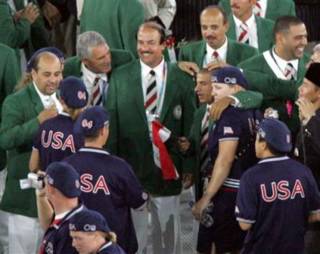VEINTICINCO PUNTOS DE VENTAJA es lo que sacaba Bush a Kerry entre los votantes indecisos la semana pasada, antes de la convención Republicana que probablemente mejore aún más las encuestas de Bush:
On the eve of the Republican National Convention, President George W. Bush is favored by twenty-five points over Massachusetts Senator John Kerry (35%-10%) among undecided likely voters when Libertarian, Constitution and Green Party presidential candidates are factored into the 2004 presidential race.El dato es de una encuesta de Zogby (una solvente empresa de estudios dirigida por John Zogby, que no es precisamente un fan del cowboy de Texas) que resulta muy interesante porque, por un lado, muestra una clara desaprobación de la gestión del presidente estadounidense, pero al mismo tiempo éste arrasa como preferido por los encuestados (mirad la sección en que se pregunta sobre las preferencias por Bush o Kerry como persona.)
¿Incoherencia? Ninguna; lo que se les escapa a los que babean en Europa porque las encuestas muestran un porcentaje mayor de personas que desaprueban la gestión de Bush que las que la censuran es que hay muchos que creen que Bush lo ha hecho mal porque no ha hecho lo suficiente, y no porque haya hecho demasiado, por ejemplo en Iraq. Desgraciadamente para Kerry, el descontento con Bush no se va a traducir necesariamente en votos a su favor, porque en esas políticas de Bush que la gente censura (no sólo la guerra, sino otras como el déficit público) Kerry sería, a sus ojos, aún peor.
ACTUALIZACIÓN. Y, según la última encuesta del Washington Post y la ABC, el panorama entre votantes decididos y votantes registrados de uno y otro partido tampoco es demasiado halagüeño para Kerry. La ventaja de Bush es mucho menor, pero las elecciones se juegan, lógicamente, entre los indecisos. Curiosamente -o quizás no tanto- los chicos del Post ven, igual que los europeos, esa paradoja que no lo es:
President Bush holds clear advantages over John F. Kerry on national security issues and leadership in the war on terrorism, largely erasing the broad gains Kerry made at his party's Boston convention last month, but voters continue to give the president negative marks on the economy and his handling of Iraq.Lo cual, como dice V-Man en los comentarios, es una pésima noticia para Kerry; se trata de las dos áreas en que muchos norteamericanos que creen que Bush no lo está haciendo piensan que Kerry lo haría aún peor.
ACTUALIZACIÓN II. Si es que esta gente parece que quiera perder:
A John F. Kerry administration would propose to Iran that the Islamic state be allowed to keep its nuclear power plants in exchange for giving up the right to retain the nuclear fuel that could be used for bomb-making, Democratic vice presidential nominee John Edwards said in an interview yesterday.Como si la palabra de los ayatolás tuviese algún valor; aún peor, como si no hubiesen aprendido nada de lo ocurrido en Corea del Norte, que gracias a la incompetente y crédula negociación de Carter como enviado especial engañó a Clinton precisamente en un planteamiento idéntico al de Edwards ahora.
Edwards said that if Iran failed to take what he called a "great bargain," it would essentially confirm that it is building nuclear weapons under the cover of a supposedly peaceful nuclear power initiative. He said that, if elected, Kerry would ensure that European allies were prepared to join the United States in levying heavy sanctions if Iran rejected the proposal. "If we are engaging with Iranians in an effort to reach this great bargain and if in fact this is a bluff that they are trying to develop nuclear weapons capability, then we know that our European friends will stand with us," Edwards said.





